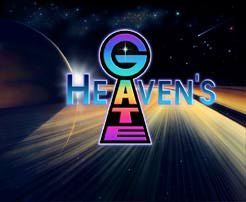Heaven's Gate Vs. Jonestown
 Ten years ago today, 39 members of the Heaven's Gate cult committed suicide in suburban San Diego. The 1997 cult suicide may have been the "largest mass suicide in U.S. history" (according to this LA Weekly article on the cult's sole survivor) but only because Jim Jones and the People's Temple left the country, establishing the Jonestown settlement in Guyana, before eliminating themselves.
Ten years ago today, 39 members of the Heaven's Gate cult committed suicide in suburban San Diego. The 1997 cult suicide may have been the "largest mass suicide in U.S. history" (according to this LA Weekly article on the cult's sole survivor) but only because Jim Jones and the People's Temple left the country, establishing the Jonestown settlement in Guyana, before eliminating themselves.What made Heaven's Gate so memorable was its story. The story involved the Hale-Bopp coment, possibly the brightest non-solar celestial body of our lifetime. Cult members took their own lives so that they could hitch a ride on a spacecraft trailing the comet, which they believed was carrying Jesus. What was fascinating about the cult's exit from this world was that members waited until the comet was physically close to earth but decided to travel to the comet spiritually. If you want to make a physical journey to a heavenly body, it makes sense to wait until that body is as close as possible to earth; if you want your disembodied soul to make the trip, physical proximity shouldn't matter.
I'm impressed that Heaven's Gate leader Marshall Applewhite was able to sell this story, with its odd mix of the material and immaterial, to his adherents. Of course, Applewhite had led the group for over two decades, so his philosophy and ethos was deeply engrained in cult members. Still, membership in the group had declined over the years, particularly following the death of Applewhite's partner, Bonnie Lu Truesdale Nettles.
Jim Jones, nearly 20 years earlier, didn't have nearly such a fantastic story for the 900-or-so people he convinced to drink the Flavor-Aid®. Jones's story was confusing, incoherent, and not entirely convincing. As with Heaven's Gate, the People's Temple had declined significantly in membership prior to the movement's final "stand." The mass suicide in Guyana was precipitated by a group who tried with mixed success to leave Jonestown, and Jones was challenged by People's Temple member Christine Miller as he explained to his followers why they should kill themselves. But Jones had successfully created a culture of paranoia: After more than two decades of outreach to the disenfranchised, Jones had become a messiah of sorts who would defiantly stand up to the rest of the world.
Jonestown was also violent. In the moments prior to the suicide, Jones loyalists infamously murdered Congressman Leo Ryan, four NBC journalists traveling with the congressman, and one defector at a nearby airstrip. Ryan and the news crew were in Jonestown investigating family member complaints and alleged human rights violations. Heaven's Gate, by contrast, was a group of peaceful web developers who caused little trouble and went largely unnoticed by the mainstream media.
I'm not sure that there's any point to this comparison. I do know that thinking and reading about the Jonestown Massacre gives me the willies, whereas researching Heaven's Gate simply sparks my curiosity. Maybe that's the difference between 39 and 900. Maybe that's the difference between a peaceful mass suicide and a violent one.
(This is a little creepy: The Heaven's Gate website is still live, just as it was in 1997.)









0 Comments:
Post a Comment
<< Home